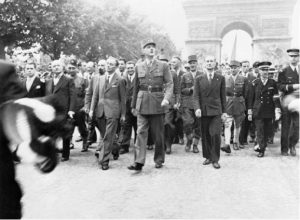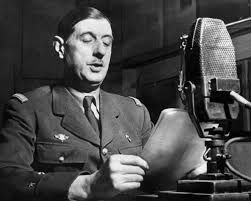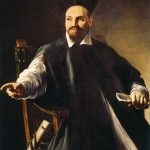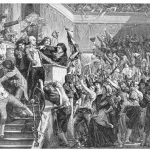Germany attacked France in May, 1940. 136 German divisions faced 125 British, French and Belgian ones. The Germans had over two thousand tanks, but even their commander admitted half were obsolete. The Allies had a little more than three thousand six hundred tanks, among which the French armour was better than anything the Germans had. But they had many more aircraft. Only the French, with their thousand aeroplanes, could provide much opposition. 400 British fighters, mostly Hawker Hurricanes were based in France. The French seemed paralysed by ther audacity and skill of Guderian’s Panzer tanks and troops, and watched with their mouths open as the Panzers crossed the Meuse,, open a fifty-mile gap in the Allied front, and then raced along the valley of the Somme towards the channel (q.v.). By 20 May they had got there. Gamelin, the French commander, seemed immovable and was replaced by a seventy-three year old – Weygand, who had been sitting in Syria. By 28 May the Germans were in Calais, cutting off the French, British and Belgian forces in the north from the remainder of French forces. The Dutch and the Belgians surrendered. The British got to Dunkirk where, miraculously, they evacuated nearly four hundred thousand troops back to English shores, unfortunately leaving tanks and ammunition behind, as there was not sufficient time to load them on to the Royal Navy ships sent, along with hundreds of small motor and sail craft which had also crossed the Channel to help. Meanwhile the French retreated to the Loire, thus separating themselves from those still holding the Maginot line, which Guderian had contemptuously avoided. In June two million Parisians left their homes and scuttled south, joining the six million who had already fled from northern France and Belgium. Weygand was replaced by Marshall Petain, who instantly accepted German surrender terms. The Atlantic coast and all Northern France were to be occupied and controlled by German forces. The rest of the country would be governed, hand in glove with the Germans, by Petain, in what became known as Vichy France. The French Army had been beaten in six weeks.
General de Gaulle was in London, mourning the loss of his country to the Nazis. He was allowed to broadcast from the BBC in June, 1940, proclaiming ‘Free France!’ with the cross of Lorraine as its emblem, but few French people heard the programme, and anyway did not know who de Gaulle was. He cursed when news came that nearly all French colonies had voted to stay with Vichy France.
In July de Gaulle had gathered only seven thousand French soldiers, airmen and a few sailors forming the Free French army. Britain bombed the French fleet at Oran and Mers-el-Kebir in North Africa, causing the first of many rows between Churchill and de Gaulle, who were not disposed to like each other, though the very tall Frenchman was Britain’s guest, an idea of George VI and Churchill. De Gaulle launched a failed attempt to establish a base at Dakar in West Africa. But this action encouraged the colonies in Chad, the French Congo, the Cameroons and the Pacific Ocean to join him. He cooperated from London with the Resistance in France (q.v.) when he could find any, and organised a secret provisional government based in Algiers, looking forward to a possible liberation.
Try as he could de Gaulle could not arouse love for him among the Americans, who found him arrogant and aloof. They distrusted him, and excluded him and the Free French from their own invasion of North Africa in November, 1942. But young Frenchmen continued to arrive on British shores, having successfully escaped from the Nazi yoke. They were eager to fight. French pilots joined the RAF and Commonwealth fighter and bomber pilots, and took part in the Battle of Britain along with the Poles. There were now 400,000 Free French fighting men in Britain, and they were to play a prominent part in future campaigns to liberate Western Europe from German occupation. When Paris was relieved near the end of the War de Gaulle flew in specifically to lead Free French forces into the cheering multitudes. A few years later, de Gaulle showed how grateful he was to the British for having kept him in England throughout the War, by vetoing their entry into the Common Market. In this way he managed to exclude Britain from her leading place in European politics (and history) He signed an historic reconciliation treaty with Germany in the same year (1963), this forming a Franco/German friendly relationship that lasts to this day. President Roosevelt of the USA never like him, and said so on numerous occasions.












Leave A Comment